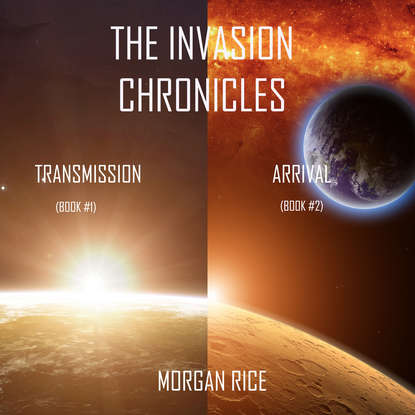 полная версия
полная версияTransmission
“It’s one of the deep space probes NASA has sent out,” Dr. Levin explained. “It flew through our solar system, sending back data, and had enough velocity to send it out past the limits of the solar system. Unfortunately, the last contact that we had with it was in 1995, so I really don’t think that—”
She stopped as her phone started to ring, taking it out as if to ignore the call. Kevin saw the moment when she stopped and stared.
“I’m sorry, I have to take this,” she said. “Yes, hello, what is it? Can it wait a moment, I’m in the middle of… okay, if it’s that urgent. A signal? You’re calling me because NASA has data coming in? But NASA always has…” She paused again, looking over at Kevin, the disbelief obvious on her face. Even so, she said it. “Can I take a guess?” she said into the phone. “You’ve just had a signal of some kind from Pioneer 11? You have? No, I can’t tell you. I’m not sure you would believe me if I did.”
She put the phone down, staring at Kevin as if seeing him for the first time in that moment.
“How did you do that?” she asked.
Kevin shrugged. “I saw it when I was waiting in the lobby.”
“You saw it? The same way that you ‘saw’ this alien landscape?” Dr. Levin stared at him, and Kevin had the sense she was trying to work something out. Probably trying to work out any way he could have cheated this, or made it happen.
It was almost a minute before she came to a decision.
“I think,” Dr. Levin said, in the careful tones of someone trying to make sure she hadn’t gone crazy, “that you had better come with me.”
CHAPTER SIX
Kevin and his mother followed Dr. Levin from SETI’s facility to a car that seemed far too small to belong to someone in her position.
“It’s very environmentally friendly,” she said, in a tone that suggested she had faced that question a lot. “Come on, it will be easier if I drive you both over. They’re quite strict about security.”
“Who is?” Kevin’s mother asked.
“NASA.”
Kevin’s breath caught at that. They were going to talk to NASA? When it came to aliens, that was even better than SETI.
The drive across Mountain View was only a short one, a few minutes at most. Even so, it was long enough for Kevin to stare out the windows at the high-tech companies spread around the area, obviously drawn there by NASA and Berkeley, the presence of so many clever people in one place pulling them in.
“We’re really going to NASA?” Kevin said. He couldn’t quite believe it, which made no sense, given all the things he’d had to believe in the last few days.
The NASA campus was everything that the SETI building hadn’t been. It was large, spread across several buildings and set in a space that managed to have views of both the surrounding hills and the bay. There was a visitors center that was essentially a tent built on a scale that seemed hard to believe, bright white and painted with the NASA logo. They drove past that, though, to a space that was closed off to the public, behind a chain-link fence and a barrier where Dr. Levin had to show ID to get them in.
“I’m expected,” she said.
“And who are they, ma’am?” the guard asked.
“This is Kevin McKenzie and his mother,” Dr. Levin said. “They’re with me.”
“They’re not on the—”
“They’re with me,” Dr. Levin said again, and for the first time, Kevin had a sense of the kind of toughness involved in her position. The guard hesitated for a moment, then produced a couple of visitors’ passes, which Dr. Levin handed over to them. Kevin hung his around his neck, and it felt like a trophy, a talisman. With this, he could go where he needed. With this, people actually believed him.
“We’ll need to go into the research areas,” Dr. Levin said. “Please be careful not to touch anything, because some of the experiments are delicate.”
She led the way inside a building that appeared to be composed mostly of delicate curves of steel and glass. This was the kind of place Kevin had been expecting when they came down to Mountain View. This was what a place that looked out into space should be. There were laboratories to either side, with the kind of advanced equipment in them that suggested they could test almost anything space threw their way. There were lasers and computers, benches and devices that looked designed for chemistry. There were workshops full of welding equipment and parts that might have been for cars, but that Kevin wanted to believe were for vehicles for use on other planets.
Dr. Levin asked around as they went, apparently trying to find out where everyone was who was connected with the news about Pioneer 11’s message. Whenever they passed someone, she stopped them, and it seemed to Kevin that she knew everyone there. SETI might be separate from all of this, the way she said it was, but it was obvious that Dr. Levin spent a lot of time here.
“Hey, Marvin, where is everybody?” she asked a bearded man in a checked shirt.
“They’re mostly gathered in the center for supercomputer research,” he said. “Something like this, they want to see what the pits will come up with.”
“The pits?” Kevin asked.
Dr. Levin smiled. “You’ll see.”
“Who are they?” the bearded man asked.
“What would you say if I told you that Kevin here can see aliens?” Dr. Levin asked.
Marvin laughed. “You can try to play up to the crazy alien hunter reputation all you want, Elise. You’re as skeptical as the rest of us.”
“Maybe not about this,” Dr. Levin said. She looked back at Kevin and his mother. “This way.”
She led the way to another part of the building, and now Kevin had the sense of extra security, with ID scanners and cameras at almost every turn. More than that, it was probably the cleanest place he had ever been. Much cleaner than, for example, his bedroom. It seemed that not a speck of dust was allowed to intrude on it without permission, let alone the piles of old clothes that filled his space until his mom told him to tidy it.
The labs were mostly empty at the moment, and empty in ways that suggested they’d been left in a hurry because something more exciting was happening. It was easy to see where they had gone. People crowded in the corridors as the three of them got closer to their destination, exchanging gossip that Kevin only caught fragments of.
“There’s a signal, an actual signal.”
“After all this time.”
“It’s not just telemetry data, or even scans. There’s something… else.”
“We’re here,” Dr. Levin said, as they arrived at a room where the door had been left open, obviously to allow for the crowd of people trying to cram inside. “Let us through, please. We need to talk to Sam.”
“Here” turned out to be a large room, filled with blinking lights below and surrounded by walkways that made it seem a bit like a theater where the actors were all computers. Kevin recognized them as computers even though they were nothing like the small, barely working laptop his mother had bought for him to do schoolwork on. These were devices the size of coffee tables, cars, rooms, all matte black and glittering with lights. The people standing or sitting close to them had on suits like the ones forensics people wore on TV shows.
“Impressed?” Dr. Levin asked.
Kevin could only nod. He didn’t have the words for a place like this. It was… incredible.
“What is this place?” his mother asked, and Kevin didn’t know if it was a good or bad thing that even his mother didn’t understand it.
“It’s where NASA does its supercomputer research,” Dr. Levin explained. “Work on AI, quantum computing, more advanced superconductors. It’s also the equipment they use to work on… complex issues. Come on, we need to talk to Sam.”
She led the way through the crowd and Kevin followed, trying to be quick enough to move into the gaps she created before they closed again. He hurried along in her wake until they came to a tall, slightly stooped man standing by one of the computers. Unlike the others, he wasn’t wearing a clean suit. His long, bony fingers seemed to be tying themselves in knots as he typed.
“Professor Brewster,” Dr. Levin said.
“Dr. Levin, I’m glad you could… wait, you’ve brought visitors. This really isn’t the moment for sightseeing, Elise.”
If Dr. Levin was annoyed by that, she didn’t show it. “David, this is Kevin McKenzie, and his mother. They’re not here to sightsee. I think Kevin might prove helpful with this. We need to see Sam.”
Professor Brewster waved a hand at the machine in front of them. It was even taller than he was, with pipes running up the side that were so cold they gave off steam into the air. It was only when Kevin saw the sign on the side, “Signals Analysis Machine,” that he realized Sam wasn’t a person’s name, but an acronym.
“You want to let a child play with a multimillion-dollar piece of engineering?” Professor Brewster asked. “I mean, he’s what? Ten?”
“I’m thirteen,” Kevin said. The difference might not be much to someone Professor Brewster’s age, but to him, it was a fourth of his life. It was more life than he had remaining. Put like that, three years was a huge amount.
“Well, I’m forty-three, I have a doctorate from Princeton, a building full of often frankly impossible geniuses who should be doing their jobs”—he looked around the room pointedly, but no one moved—“and now, apparently a thirteen-year-old who wants to play with my supercomputer just as it is about to get to work on a signal from a probe we thought long dead.”
He seemed like a man who didn’t like stress much. Kevin guessed that was probably a disadvantage in his job.
“Kevin’s here because of the signal,” Dr. Levin said. “He… well, he predicted that it would occur.”
“Impossible,” Professor Brewster said. “Elise, you know I have always respected your efforts to keep SETI research in the realm of serious science, but this seems to run in completely the opposite direction. It’s obviously a trick.”
Dr. Levin sighed. “I know what I saw, David. He told me that there would be something happening with Pioneer 11, and then we got the signal. Will you at least play it for us?”
“Oh, very well,” Professor Brewster said. He gestured to one of the scientists working around the supercomputer. “Play it so that we can get on with our work.”
The scientist nodded and tapped a control interface a few times. Data flashed up on a screen in string after string of numbers, but Kevin was more interested in the audio signal that came with it. It was a strange mechanical chattering that sounded nothing like language, more like the kind of interference that might come from a computer going wrong.
Even so, he understood it. He just didn’t know how.
“You need to adjust one of your radio telescopes,” Kevin said, the knowledge just sitting in his mind. There were numbers too. Two sets of them, one marginally different from the other. “I think… the first seems wrong somehow, and the second is what it should be.”
“What?” Professor Brewster and Dr. Levin asked almost simultaneously, although with very different expressions. Dr. Levin looked amazed. Professor Brewster mostly looked irritated.
“It’s what it means,” Kevin said. He shrugged. “I mean, I guess. I don’t know how I know it.”
“You don’t know it,” Professor Brewster insisted. “If there’s any meaning in there at all, which frankly isn’t likely, it will take SAM hours to decode it, if it’s possible at all.
“I just told you what it means,” Kevin insisted. “I can… it just makes sense to me.”
“You should listen to him, David,” Dr. Levin said. “At least search for the numbers, see if they mean anything. Can you write them down, Kevin?”
She held out a piece of paper and a pen, and Kevin noted them as clearly as he could. He held it out to Professor Brewster, who took it with bad grace.
“We have better things to do than this, Elise,” he said. “Right, that’s enough. Out. We have work to do here.”
He shooed them away, and Dr. Levin didn’t seem inclined to argue. Instead, she took Kevin and his mother out into the corridors of the research facility again.
“Come on,” she said. “David might be too busy to actually use that gigantic brain of his, but there are plenty of people here who owe me favors.”
“What kind of favors?” Kevin’s mother asked.
Dr. Levin looked back at Kevin. “The kind where we find out exactly how Kevin is managing to receive and decode signals from outer space.”
***“You need to hold still, Kevin,” said an overweight researcher wearing a Hawaiian shirt under his lab coat. He just went by “Phil” even though the nameplate on his door declared that he had at least as many PhDs as anyone else. He seemed to be a friend of Dr. Levin’s, although that might have had something to do with the foot-long sandwich she picked up from the canteen before going to visit him. “It won’t produce a clear image if you move.”
Kevin did his best, lying still in the cramped interior of an MRI machine. It made him feel like a torpedo about to be launched into the ocean, and the confined space was only made worse by a regular dull thudding, which sounded as though someone was hammering on the outside of it while he lay there. His experiences in the hospital told him that was probably normal, and not a sign that the whole thing was about to collapse. Even so, it was hard to hold still for as long as it took for the thing to scan him.
“Almost there,” Phil called. “Just hold your breath for a moment. And relax.”
Kevin wished he could relax. The last couple of hours had been busy ones. There had been scientists, and labs, and tests. Lots of tests. There were cognitive tests and imaging scans, things like X-rays and word association tests while Kevin found various kinds of devices pointed at him, designed to pump different kinds of signals toward his body.
Eventually, even Phil seemed to be getting tired of shooting rays at Kevin.
“Okay, you can come out.”
He helped Kevin from the machine, then led the way over to where Dr. Levin and Kevin’s mother were waiting. The researcher shook his head as he pointed to the screen, and a series of black-and-white images that Kevin guessed must be of the inside of his brain. If so, brains looked weirder than he’d thought.
“I’m sorry, Elise, but there’s no sign of anything different about him that wouldn’t be explained by his illness,” he said.
“Keep looking,” Dr. Levin said.
“How, exactly?” he asked. “I’m telling you, I’ve used almost every test it’s possible to do on a human being—fMRI, CAT scan, psych battery, you name it. I’ve fired so many different frequencies at Kevin here that it’s a wonder he isn’t picking up the local radio. Short of subjecting him to radioactive isotopes or actually dissecting him—”
“No,” Kevin’s mother said, firmly. Kevin didn’t like that idea either.
Phil shook his head. “There’s just nothing else there to find.”
Kevin could hear the man’s disappointment. Unlike Professor Brewster, he obviously liked the idea of someone being able to hear alien signals. That disappointment mirrored his own. He’d been sure that these people, with all their brains and their laboratories, would be able to find out what was happening, but it looked—
A man burst into the room, and it took Kevin a moment to recognize the gangly frame of Professor Brewster. He looked, if anything, even more agitated than he had when he’d been throwing them out of the supercomputer pit. He was holding a tablet, gripping it so tightly that Kevin suspected he might crack it.
“David, if this is about the use of resources…” Dr. Levin began.
The tall scientist looked over at her as if trying to work out what she was talking about, then shook his head. “Not that. I just want to know how you did it. How did you know?”
“Know what?” Kevin asked.
“Don’t play dumb,” the scientist said. He held out the tablet for them to look at. “One of our people ran those numbers you gave us through our systems. It turns out that they were the current settings for one of our radio telescopes, just as you said. No one who wasn’t working at the observatory could know that. So how did you know?”
“Know what?” Kevin asked.
“Know what would happen when we changed it!”
Professor Brewster pressed something on his tablet.
“This is a feed from it.”
He thrust the pad at Kevin, holding it out like an accusation. A buzzing, clicking signal came from it, which sounded as though it might just be static, or a mechanical problem, or crickets stuck somewhere in the workings of the machine.
To Kevin, though, the words were clear.
We are coming. Be prepared to accept us.
CHAPTER SEVEN
“We?” Dr. Levin asked. She sounded as though she could barely contain her excitement. “Who is we? Are we talking about some kind of alien civilization?”
“Hold on a second,” Professor Brewster snapped, sounding skeptical. “Maybe Kevin’s is the wrong translation. Maybe there is nothing to even translate—maybe it’s just a bunch of noise. Maybe it’s just a figment of the boy’s imagination.”
“Then how did he know the coordinates?” Dr. Levin asked. “We know that someone sent this signal. Just think of the possibilities…”
She trailed off, as if she couldn’t quite comprehend all the possibilities.
“Maybe no one sent it,” another scientist piped up. “Space is filled with signals that have no sender, or receiver.”
“Still,” Dr. Levin insisted, “you can’t discount the possibility that this truly is a signal sent by another society. And that Kevin did indeed interpret it directly. What if he did? Are you prepared to shut down that possibility? Are you prepared to just walk away from it? To accept the consequences?”
Brewster fell into a grudging silence.
“We need more information,” he finally said. “We need to study Kevin further.”
“Study him further?” his mother said. “This is my son.”
“True,” Dr. Levin countered. “And yet your son may also just be our planet’s sole link to alien life.”
*Kevin sat in the room they had given him and looked around, wondering what it was for. It looked as though it might have been designed for the observation of people over long periods. Either that, or giant goldfish.
It was comfortable, but it was impossible to forget that it was in the middle of the laboratory. The bed was in the middle of the room, and everything seemed to be a pristine, clinical white. Kevin suspected there might be cameras looking down. There was certainly a length of glass along one wall that was obviously one way. It made him feel a little like a frog waiting to be dissected in someone’s biology class.
“Do you have everything you need?” his mother asked. “Have they even fed you yet?”
Trust his mother to find a way to be embarrassing even in a situation like this.
“Yes, Mom, they’re feeding me,” Kevin said.
“I just worry about you,” she said.
“You have to work,” Kevin said. He understood. His mother couldn’t afford to take more time off. Not even for this. There were too many bills to pay, and Kevin being sick had only added medical bills to the list. He didn’t like hearing the guilt in his mother’s voice, as if she was doing something wrong by taking him to the place where they hunted for aliens.
“This is the best place for you, though,” his mother said. She sounded as though she was trying to convince herself.
“It’s a cool place to be,” Kevin assured her. “They have so many things going on.”
It was amazing being a part of something this important.
“Hi, Kevin,” Phil said, poking his head around the door. He seemed to brighten even more at the sight of Kevin’s mother. “Hi, Ms. McKenzie.”
“Call me Rebecca,” his mother said. There was something strange in that, maybe because it wasn’t something she said very often.
“I thought I would give Kevin the grand tour,” Phil said. “Maybe you’d like to join us?”
“That sounds good,” his mother said, and again, Kevin had a sense of a side to it that was… no, he shouldn’t think like that. That was just gross. Parents weren’t supposed to go around liking people. That was practically… well, it made the idea of alien worlds look normal.
“If you’d both like to come with me,” Phil said, leading the way down the halls. “I mean, officially, I guess we’re not supposed to just wander around, because some of the projects are kind of sensitive, but I sometimes think we kind of overdo that, you know?”
He led the way to a space where scientists appeared to be firing a laser at a blank surface again and again, making minute adjustments between each attempt.
“They’re looking into ways lasers might be used in mining asteroids,” Phil explained. There was something about the look he gave Kevin’s mom that said he was trying to impress her. Kevin found that kind of funny. His mom was his mom. She wasn’t going to be impressed by lasers. Even if they were kind of cool.
After that, he showed them a space where drones flew around in a large room like insects, moving fast but somehow never colliding with one another.
“We’re doing work on using AI to make it so that drones can interact without crashing,” Phil said.
Kevin saw his mother smile at that. “So that there’s less chance of losing the next package I order?”
Phil nodded. “Well, that or they could be used in building work, or for work in extreme environments.”
Kevin wasn’t sure how he felt about his mom and Phil getting along so well. He was probably supposed to feel happy for her or something, but this was his mom. He was sure there were supposed to be rules about that kind of thing. He set off toward another door, hoping to hurry the tour along before the two looked meaningfully into one another’s eyes or something.
He opened it, and found himself staring at a thing out of his nightmares.
Kevin staggered back as he found himself face to face with a robot almost as large as he was, covered in spikes and blades, two great pincers sticking out from the front like a hungry ant. It took him a moment to realize that it wasn’t moving, wasn’t any kind of threat to him in spite of how fierce it looked.
“Is this some kind of weapons project?” Kevin asked. “Something for the military?”
It looked like the kind of thing that would be terrifying coming toward someone on a battlefield. It managed to look pretty terrifying even standing still.
“It’s for the local robot fighting league,” Phil said. “Some of the grad students from Berkeley come up with vicious stuff.”
He looked over at Kevin’s mom as if hoping she would declare herself to be a huge fan of robot fighting. When she didn’t look particularly impressed, Kevin dared to breathe a sigh of relief. It seemed that the world had returned to normal, kind of.
His mother hugged him. “I have to go, Kevin. I wish I didn’t, but…”
Kevin hugged her back. “I know.”
Even though he knew she would come back soon, it was hard to let her go.
When she was gone, Kevin turned to Phil. “So,” he said. “What now?”
“Now, we have a bunch more tests to get through,” Phil said.
A bunch didn’t cover it. Even though Phil had tried whole batteries of tests on Kevin before, both Professor Brewster and Dr. Levin seemed determined that they should keep going. Dr. Levin seemed to hope that by understanding what Kevin could do better, they might be able to make more contact with alien civilizations. Professor Brewster… well, Kevin suspected that he hoped it would all prove to be nothing, a mistake.
Either way, it meant test after test with different sets of scientists, question after question, most of which Kevin didn’t have the answers to.
“I don’t have any control over what I translate,” Kevin insisted, when one of the scientists wanted to know if he could look around the alien world he saw to give them more data on it. “I don’t even know how I’m doing it. When you play the signals, it’s just… obvious.”
He suspected the scientists weren’t very satisfied with that, but Kevin didn’t know what else to say. He got what he got, and for the moment, that seemed to be mostly the countdown in his head, pulsing away ever faster, along with the memory of a world eclipsed by a bright, all-consuming light. So far, it had been the only image he’d gotten. The signal seemed to be just words.
Kevin, needing a break, found a quiet corner in one of the research center’s recreation rooms and pulled out his phone and Skyped with Luna.












